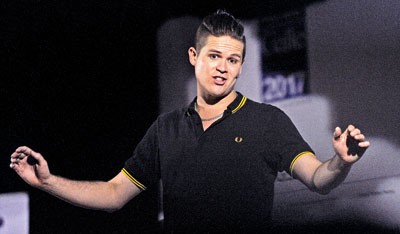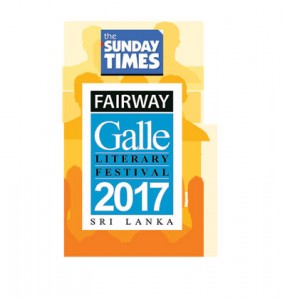‘I look people in the eye, I tell them stories’

One man show: Luke Wright in action at the FGLF. Pic by Amila Gamage
All Luke Wright needed to keep his audience enrapt for an entire hour was a stage, a single chair and a long poem. A participant at this year’s Fairway Galle Literary Festival held from January 11-15, the performance poet shared with his entranced viewers, his award winning piece “What I Learned from Johnny Bevan”.
As Luke sauntered across the practically bare stage, sometimes jumping into the audience, sometimes talking to them, suddenly switching into a narrator or one of the three characters, “What I Learned from Johnny Bevan” proved to be a beautiful collision of genres against fist pumping dialogue and sincere emotion. The author himself isn’t too sure how to label his acclaimed piece. “Johnny Bevan uses a new kind of format for me, but I have long wondered if I could write a long form single story poem to sustain a show on its own,” he explains.
Before Luke was an established broadcaster, award winning poet- showing at the Edinburgh Fringe and performing around the world, he was a teenager with a love for comedy jotting lyrics, “bits of poems”. At 16 he saw poets John Cooper Clarke, Martin Newell and Ross Sutherland perform at the Colchester Arts Centre in Essex. “I loved everything performance poetry could be – funny, clever, moving, and these guys just made it look so cool,” he says, deciding his career at that moment.
“I figured that would be an impossible dream,” Luke admits about his slow start back in the 90’s. Living in, what he looks back as “the celebrity age” meant that fame mattered more than talent. ”I thought that perhaps if I could have some overnight success I might be able to build a career off the back of it. “
The piece’s main characters- Nick, bubblewrapped in his middle class upbringing is bewitched by the magnetic, revolutionary working class hero Johnny, who questions and broadens his thinking. Their friendship which begins at university, grows, fades and then boils over the course of twenty years. The success and praise for “Johnny Bevan” Luke hopes, is because “I think people enjoy the nostalgia of that university relationship and the galvanizing effect talking about politics has.” The characters belong to his own experiences at college and echo the frustration, disillusionment of those years; though steeped in British politics it has everyone identifying with either of the angry young men.
“We all kind of toiled in our own towns at first, not meeting up,” he adds, thinking back to his start in performance poetry. “The scene is way more connected now because of the internet and big festivals like Latitude and Glastonbury that bring poets together.”
As the audience watch Johnny and Nick’s outbursts, failed dreams and the still invisible hold the class system has over their life, Luke’s everyday dialogue manages to transform the blank stage into a basic flat or our mundane surroundings. “You think I’m playing the victim” we watch the once compelling underdog Johnny shoot back at Nick after almost twenty years. “I am the victim”, echoes through the hall, forcing one’s thoughts to another Johnny in their lives who faces the same reality.
Though “Johnny Bevan” has been showered with praise since its debut, the stirring piece isn’t necessarily his best, Luke thinks. Maybe it’s how the piece tangos through sadness and humour, which in Luke’s opinion is what the best live poetry does. Maybe it’s the introspective, angrily honest lyrics of Kurt Cobain, Lennon/McCartney and the poetry of John Betjeman, Phillip Larkin and others who inspired Luke growing up. For the poet, it’s luck. “You write and write and every once in a while what you want to write is what people want to hear.”
Today, fame is irrelevant for the artist. “You don’t need to be famous to make a living as an artist, you just need a few dedicated fans who want to come and see you perform each year. Quoting John Hegley, “if 5000 people give you £10 a year, that’s a living.”
As a writer/ performer, the magic, he divulges, is in the words. “But I am a big believer in talking directly to people. We would think nothing of sitting and talking to our best friend for an hour.” Summing up the audience experience of being a part of his performance,” he says, “I look people in the eye as I perform, I tell them stories, I include them, that helps.”


